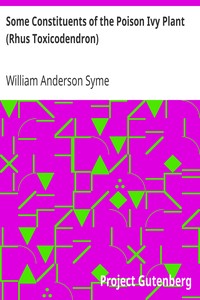Some Constituents of the Poison Ivy Plant (Rhus Toxicodendron) by Syme
"Some Constituents of the Poison Ivy Plant (Rhus Toxicodendron)" by Syme is a scientific dissertation submitted to the Board of University Studies of Johns Hopkins University in 1906. This publication focuses on the chemical composition and properties of the poison ivy plant, investigating its various constituents and the nature of its toxicity. The work is a part of the early 20th-century scientific literature aimed at deepening the understanding of plant biochemistry and
the potential risks associated with botanical substances. The dissertation details extensive research into the components of poison ivy, particularly focusing on isolating and analyzing its active toxic principles, such as gallic acid, fisetin, and rhamnose. Syme reviews previous investigations and experimental methods to extract and characterize these compounds, including the identification of a poisonous tar or gum within the plant that contributes to its irritating skin effects. He also discusses the potential uses of potassium permanganate as a remedy for poison ivy reactions. The findings provide a comprehensive look at the chemistry of a well-known plant, contributing valuable information to the field of pharmacognosy and the study of plant-derived toxins. (This is an automatically generated summary.)
Read or download for free
| Reading Options | Url | Size | |||
|---|---|---|---|---|---|
| Read now! | https://www.gutenberg.org/ebooks/34510.html.images | 119 kB | |||
| EPUB3 (E-readers incl. Send-to-Kindle) | https://www.gutenberg.org/ebooks/34510.epub3.images | 255 kB | |||
| EPUB (older E-readers) | https://www.gutenberg.org/ebooks/34510.epub.images | 255 kB | |||
| EPUB (no images, older E-readers) | https://www.gutenberg.org/ebooks/34510.epub.noimages | 94 kB | |||
| Kindle | https://www.gutenberg.org/ebooks/34510.kf8.images | 482 kB | |||
| older Kindles | https://www.gutenberg.org/ebooks/34510.kindle.images | 466 kB | |||
| Plain Text UTF-8 | https://www.gutenberg.org/ebooks/34510.txt.utf-8 | 97 kB | |||
| Download HTML (zip) | https://www.gutenberg.org/cache/epub/34510/pg34510-h.zip | 252 kB | |||
| There may be more files related to this item. | |||||
Similar Books
About this eBook
| Author | Syme, William Anderson, 1879- |
|---|---|
| LoC No. | 06037943 |
| Title | Some Constituents of the Poison Ivy Plant (Rhus Toxicodendron) |
| Credits |
Produced by Bryan Ness, Josephine Paolucci and the Online Distributed Proofreading Team at www.pgdp.net. (This book was produced from scanned images of public domain material from the Google Print project.) |
| Reading Level | Reading ease score: 61.8 (8th & 9th grade). Neither easy nor difficult to read. |
| Language | English |
| LoC Class | QK: Science: Botany |
| Subject | Poison ivy |
| Category | Text |
| EBook-No. | 34510 |
| Release Date | Nov 30, 2010 |
| Most Recently Updated | Jan 7, 2021 |
| Copyright Status | Public domain in the USA. |
| Downloads | 651 downloads in the last 30 days. |
| Project Gutenberg eBooks are always free! | |

